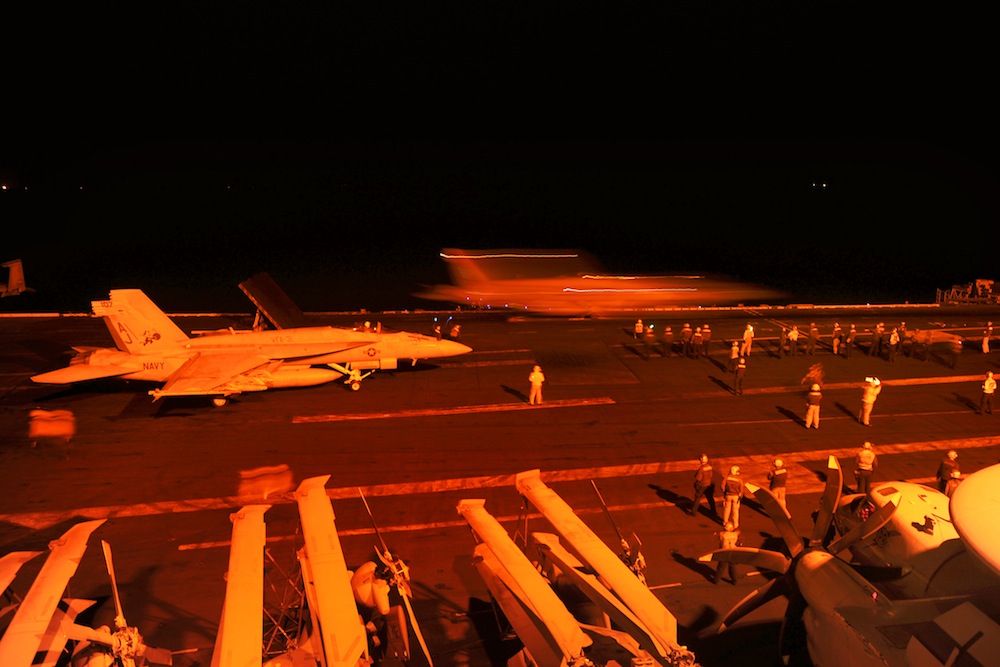
The U.S.-led bombing campaign against Islamic State of Iraq and Greater Syria (ISIS) is complex. A coalition made up of the U.S. and seven allies began bombing ISIS targets in Iraq in August. A month later, the U.S. began bombing targets belonging to the militant group in Syria, along with four allies.
Should the civilized world care that none of the seven U.S. allies bombing ISIS targets in Iraq (Australia, Belgium, Canada, Denmark, France, Netherlands and the United Kingdom) are bombing ISIS in Syria? And that, ipso facto, none of the four U.S. allies bombing targets in Syria (Bahrain, Jordan, Saudi Arabia and the United Arab Emirates) are bombing ISIS targets in Iraq?
Does it matter that the U.S. stands alone when it comes to bombing both?
Perhaps more important is the lopsided nature of the air strikes: since Sept. 23, the allies have accounted for nearly 40% of close air support, interdiction and escort sorties, and 25% of total missions flown. “Many of those sorties that conduct dynamic targeting in support of ground forces require specialized capability, and frequently they do not result in a necessary strike on [ISIS] forces, equipment or facilities,” Gary Boucher, spokesman for the campaign, dubbed Operation Inherent Resolve, said Tuesday.
But the allies have accounted for only 14% of the air strikes. That’s less than one out of every seven. Think of it like a workweek: the U.S. military is working Monday through Saturday; and the allies work Sunday. It works out to an average of two non-U.S. daily air strikes against ISIS targets in Iraq, shared among seven nations, and less than one non-U.S. air strike per day among the four countries attacking ISIS targets in Syria.
“The real problem is how few sorties most other countries are flying,” says Anthony Cordesman, a military expert at the Center for Strategic and International Studies. “A 62-country token alliance is only marginally better than the U.S. alone.”
As small as the allies’ contributions may be, there are back-home considerations driving which side of the porous Iraq-Syria border they’re bombing. Many of the nations bombing ISIS in Iraq fought alongside the U.S. there following the 2003 invasion, and don’t want their earlier sacrifices to be in vain. The states bombing inside Syria want to see Syrian President Bashar Assad gone.
The anemic response from the world community suggests the war against various forms of Islamic zealotry is going to get worse before it gets better. Following Monday’s jihadist-inspired bloodshed at an Australian chocolate shop, and Tuesday’s massacre of at least 141 people, nearly all of them schoolchildren, by Islamic militants at a military-run school in Pakistan, it’s past time to ask when the international community is going to come up with a plan to deal with this metastasizing horror.
The right response isn’t necessarily more bombing by more countries. The targets are often elusive and defy military action. But until there’s more buy-in from the rest of the world, Washington’s efforts, military and otherwise, are doomed.
More Must-Reads from TIME
- Donald Trump Is TIME's 2024 Person of the Year
- Why We Chose Trump as Person of the Year
- Is Intermittent Fasting Good or Bad for You?
- The 100 Must-Read Books of 2024
- The 20 Best Christmas TV Episodes
- Column: If Optimism Feels Ridiculous Now, Try Hope
- The Future of Climate Action Is Trade Policy
- Merle Bombardieri Is Helping People Make the Baby Decision
Contact us at letters@time.com